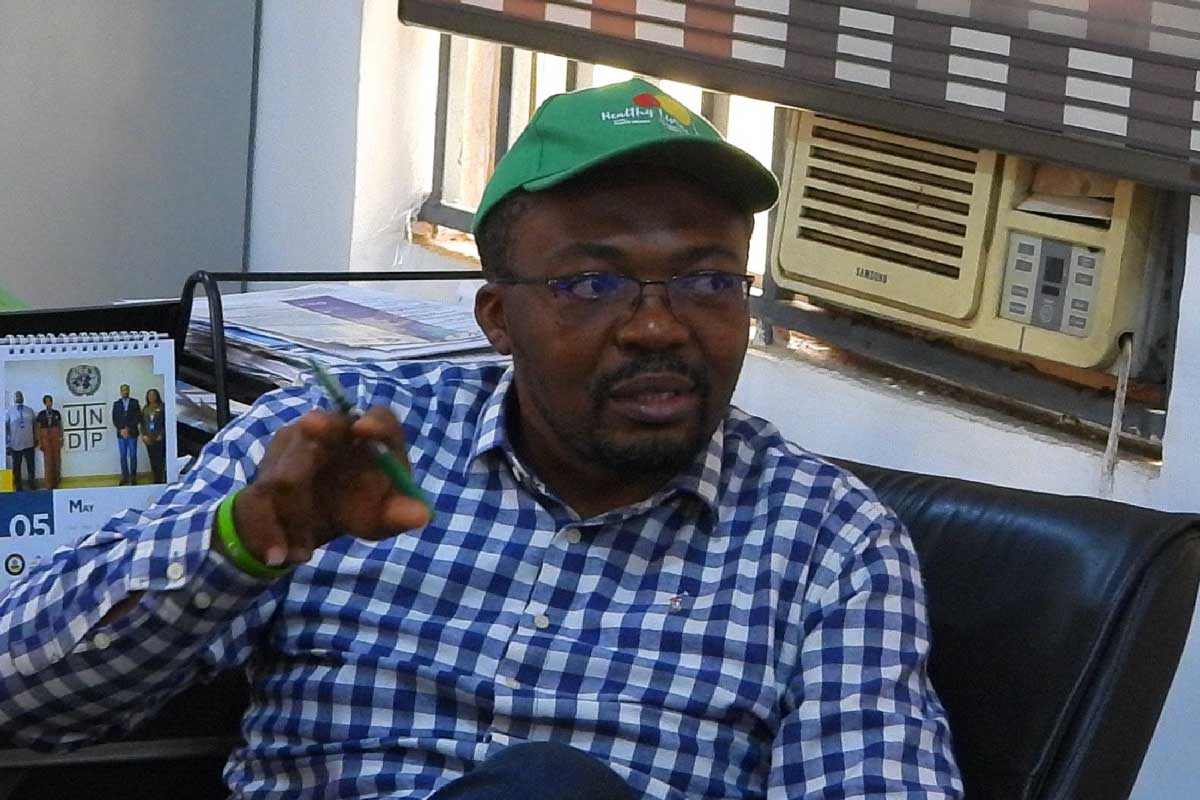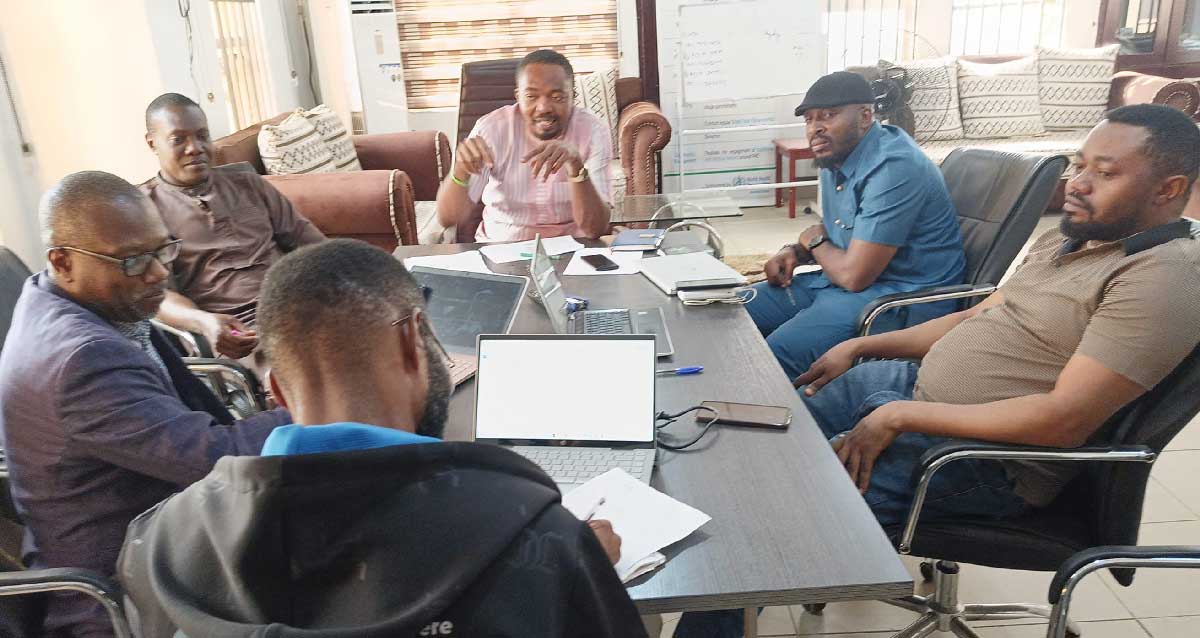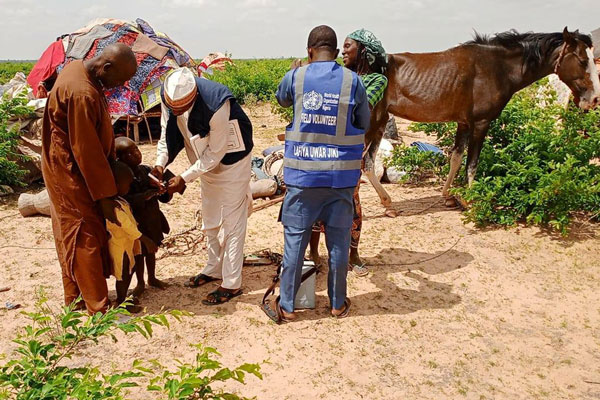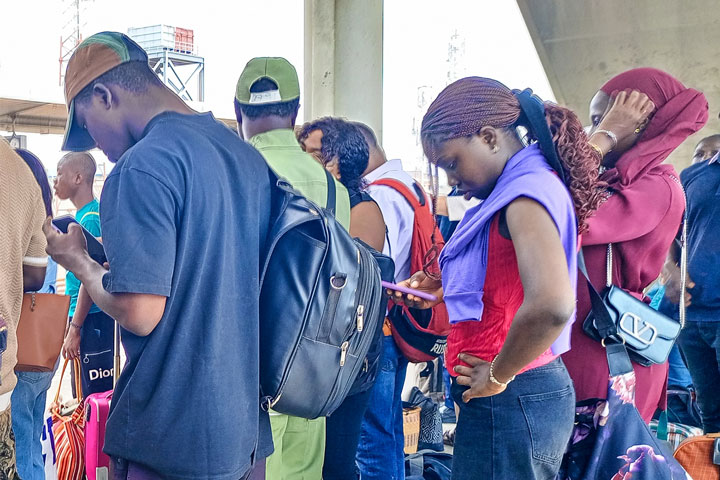This Nigerian state is using telemedicine to bring doctors closer to rural families
Faced with a shortage of doctors, Anambra State, in southern Nigeria, is using telemedicine to bridge healthcare gaps in rural communities. Local medics say the digital initiative is helping to improve vaccination uptake.
- 26 November 2025
- 7 min read
- by Jesusegun Alagbe

When her two-year-old son developed a persistent fever and headache a couple of months ago, Doris Onuorah feared the worst.
The general hospital she typically relies on is about an hour away, and the last time Onuorah had needed to make that journey, she had spent hours waiting for a doctor. This time, however, a nurse at the primary healthcare centre in her community, Nneogidi, Anambra State, in southern Nigeria, simply powered on a tablet and within minutes, Onuorah was speaking to a physician.
Inside the small consultation room, the scene looked ordinary – plastic chairs, a wooden desk piled with patient cards and a sick child cradled in his mother’s arms. But on the desk sat a tablet propped up on a stand, its screen glowing with the face of a doctor many kilometres away. The nurse checked the child’s temperature and relayed the details to the doctor, who was watching in real time.
After asking a few questions, including whether the child had ever taken the oral polio vaccine (OPV), the doctor prescribed medication and advised follow-up. Within minutes, the consultation was over, with Onuorah promising to make sure her son got a dose of OPV.
“My son recovered a few days after taking the doctor’s instructions, and I promised him [the doctor] that I would never allow my son to miss his routine immunisation again. I had been negligent before, but when he told me the benefits of immunisation, I decided to turn a new leaf,” Onuorah told VaccinesWork.
Better access, better compliance
“The most interesting thing for me was that I was able to speak to a doctor live without having to travel a long distance or the doctor having to come to the village. This is a great development for people like me who prefer to visit doctors at general hospitals but can’t do so all the time due to transport and time costs,” Onuorah said.
A nurse at the health centre, who sought anonymity because they were not authorised to speak to the media, said residents seem to be more relaxed and attentive when speaking to doctors through the screen, and that she had been learning a lot more on the job by watching how the doctors are relating with the patients.
“Since the initiative [telemedicine] was introduced last year, there has been improved healthcare delivery at the health centre. Our patients listen more and obey the doctors better than [they do] us. Some parents who had unvaccinated children are now bringing them for routine immunisation because the doctors told them via the screen. It’s amusing because some of them would rather not listen to us until now,” the nurse said.

Redefining “screening”
The World Health Organization (WHO) finds that telemedicine – that is, the use of digital communication technologies to deliver healthcare at a distance – has great potential to address some of the challenges faced by both developed and developing countries in providing accessible, cost-effective, high-quality healthcare services. Leapfrogging geographical barriers is particularly useful for rural and under-served communities in developing countries.
In Nigeria, Anambra state stands out for its enthusiastic adoption of telemedicine. Launched last November, the programme is in large part a response to the nationwide healthcare sector brain drain, which sees many doctors and nurses relocating to Europe, North America, and the United Arab Emirates. The upshot is that many local hospitals and primary healthcare centres are left severely understaffed.
Doctors, health officers and patients in rural Anambra call the fledgling initiative a success – even a “lifeline”.
In the town of Awkuzu, Oyi Local Government Area, Amara Sunday said she once needed to spend hours to and from the general hospital in Onitsha, a major city. Today, inside her town’s modest primary healthcare centre, a health officer just taps a tablet screen and within minutes connects her to a doctor.
“Except for very serious issues, I think I’m now more comfortable visiting the health centre. I didn’t like going there for medical care before because we hardly got reliable care from the health workers. Now I can ask to speak to a doctor anywhere within the state,” she said.
The Anambra model
Dr Afam Obidike, the Anambra State Commissioner for Health, said the state’s approach to telemedicine is designed to a simple objective: that residents of all 21 local government areas and 326 wards across the state have access to a doctor.
“We launched the programme to bridge the shortage of human resources, particularly doctors, in our health sector. In all 326 wards, residents can [now] access the telemedicine service. Also, we have a telemedicine hub in each of the 21 local government areas. Two doctors man each hub. A nurse or health officer at a ward can always call the telemedicine hub at their local government headquarters if they can’t handle an issue,” Obidike told VaccinesWork.
“We also designed it in a way that if the two doctors at a particular telemedicine hub are busy and a health officer needs a doctor’s attention urgently, the health officer can call a doctor at another hub that is not in their local government,” he said.
Virtual consultations, real vaccination gains
Obidike explained that the programme has also been helping to raise awareness about vaccines and the prevention of child mortality, especially in rural areas.
“The initiative is also boosting vaccine awareness in the communities because, in many children’s cases, the telemedicine doctors have had to advise parents to take their children for immunisation. Nurses and health workers are now reporting that there is improved interest by mothers to bring their children for routine immunisation.
“This is happening particularly in hard-to-reach areas where doctors don’t go, and where there is a high number of unvaccinated children.”
It isn’t just that a doctor’s advice seems to land with more weight – other health officials say that by connecting frontline workers, patients, and doctors in real time, the system is gaining trust dividends, and helping to reduce fear and misinformation more generally. These are forces that often lie behind the hesitancy to vaccinate.
“Telemedicine has become more than a consultation tool – it’s now part of how we keep children vaccinated. Now, we can follow up on missed immunisations immediately, and parents trust the process more when a doctor explains the importance directly to them, even through a screen,” said Nneka Nwauba, a health officer at the Okpeze Primary Healthcare Centre in Orumba North Local Government Area.
“Truly, from my experience, when parents can talk to a doctor, they become more confident about vaccinating their children. The programme can be a great tool in closing the trust gap that often stands between a child and a life-saving vaccine,” Dr Chinonso Collins, a medical doctor based in Awka, told VaccinesWork.
Filling in the cracks
Obidike, the health commissioner, said that while steps are being taken to scale the programme, rolling out telemedicine across the state is not without its hurdles.
“We cannot deny that there are challenges – of internet connectivity, high data fees, and poor handling of the gadgets by some health workers in the communities. There are also cases of health workers in communities feeling low self-esteem because many patients are increasingly preferring to seek care from doctors. Most people would rather believe a doctor’s diagnosis than a health officer’s,” he said.
“However, we are trying to solve these challenges by improving network access and continuously training nurses and health officers. We also have a regular review of the programme with the telemedicine doctors,” Obidike added.
Have you read?
Sustainability concern
Professor Francis Faduyile, a former president of the Nigerian Medical Association, broadly supportive of Anambra’s telemedicine project, raised a concern about its sustainability.
“The Anambra telemedicine initiative is a laudable development. It is a good way to tackle the shortage of doctors and improve healthcare delivery in rural areas. But one of the main problems we’ve had in Nigeria is that of sustainability. If it can be sustained, especially beyond the present government in the state, it will boost primary healthcare,” he told VaccinesWork.
The caprices of the political cycle constitute one threat to its longevity, the medical professor flagged. Like in most countries, politicians at all government levels in Nigeria have been known to drop even popular projects due to factors like political transition, corruption, inadequate planning and financial constraints. Infrastructure projects – including the establishment of a telemedicine network – are at particular risk from a baked-in tendency to political inconsistency.
Obidike, Anambra’s health commissioner, said various means have been put in place to make the telemedicine project work, even after the current government exits. “Even in terms of funding, we have made adequate arrangements to ensure the sustainability of the programme,” he said.







